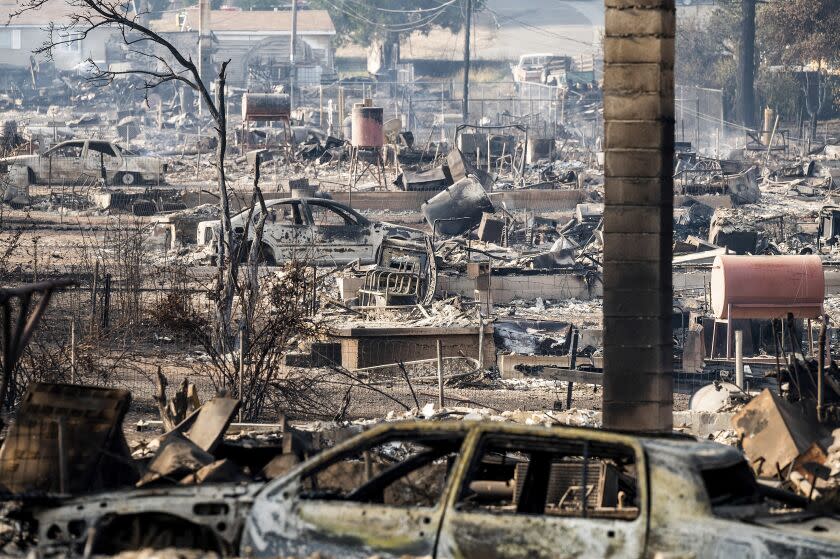Lumber mill says hot ash may have sparked deadly wildfire

The operator of a Weed lumber mill is investigating whether hot ash stored on its campus started a wildfire that killed two people and burned dozens of homes last week.
The Mill fire ignited Sept. 2 on or near the property of Roseburg Forest Products and quickly spread to the communities of Lincoln Heights and Lake Shastina, resulting in the deaths of two women, 66 and 73, according to the Siskiyou County sheriff. Authorities have not officially determined the cause of the fire, which was 75% contained Thursday after burning nearly 4,000 acres.
The Springfield, Ore.-based wood products company is looking into whether the fire was started by ash from its cogeneration facility, which burns wood remnants to power its veneer mill, the firm said in a news release. The ash is supposed to be sprayed with cooling water after it is ejected by the generator, but it is possible that a water-spraying machine failed, the company said. The water spraying machine was supplied by a third-party equipment manufacturer, the release said.
Two buildings on the mill's campus burned: the planer building — a large warehouse used to store spare parts — and Shed 17 — a smaller bunker where the ash was stored, said Pete Hillan, a spokesman for the company. Shed 17, which shared a wall with the planer building, was made of cement but was housed in an old wooden frame, he said. There was less than half a truckload of ash inside the bunker at the time the fire started, he added.
Multiple witnesses said the fire appeared to have spread to homes after starting at or near the planer building. The company has not confirmed that, but it is cooperating with the fire officials' investigation and conducting its own review, Hillan said.
A lawsuit filed Thursday in Sacramento County Superior Court on behalf of a family whose home was destroyed alleges the company failed to properly handle the hot ash, despite being aware that the area was highly susceptible to catastrophic fires. It cites trespass, negligence, private and public nuisance and is seeking both compensatory and punitive damages.
“It’s a very serious case,” said attorney James Frantz, who is representing the family. He has been contacted by several other residents and anticipates filing more claims, he said.
The lawyer said that an investigation by his firm uncovered multiple complaints about the company’s handling ofhot ash over a long period of time.
“It appears that they consciously disregarded the safety not only of their employees but of the entire communities of Lincoln Heights and Lake Shastina,” he said. “It’s really egregious, frankly, that this production of lumber was handled in such a negligent fashion.”
The company is aware that some are alleging it has a history of mishandling the ash but is not aware of the facts around those claims, Hillan said.
He declined to comment on the lawsuit, saying the company had not yet received a copy of the complaint.
Roseburg Forest Products has also announced that it plans to provide up to $50 million for a community restoration fund to help meet initial recovery needs of residents affected by the fire. Those displaced include three employees who lost homes. The fund, which is intended to help people with emergency expenses that might not be covered or paid out promptly by their home or auto insurers, is not an admission of liability, the company said.
Company officials have seen how long it's taken for residents to get financial help after other fires and wanted to do something to help the community where Roseburg has been a substantial employer for 40 years, Hillan said.
"We just feel this is the right thing to do regardless of the origin," he said.
If the company determines that its property started the fire, it will also ask its insurers to open a claims processing office in Weed where residents can file claims without retaining a lawyer, and adjusters can review and pay them out, the news release states.
Frantz said that $50 million is inadequate to cover the losses, which include upward of 100 structures destroyed, and called it “ridiculous” that the company would suggest that residents need not hire attorneys, which he described as a way to avoid a full airing of what transpired.
“This case needs to be litigated in a court in front of a jury, and they need to be held completely accountable for what’s happened here,” he said.
Frantz, whose firm has handled more than 7,000 fire claims in California, is also representing about 30 Siskiyou County residents affected by the McKinney fire, which killed four people and burned more than 60,000 acres after it started in Klamath National Forest on July 29. A lawsuit filed on those residents' behalf alleges the fire was started by PacifiCorp power equipment; it appears a tree fell into a distribution line, Frantz said.
Utility companies are also being eyed in two other recent fires. Southern California Edison reported “circuit activity” about the same time the deadly, 19,000-acre Fairview fire started Monday in Hemet. And Pacific Gas & Electric Co. filed a report with the state disclosing “electrical activity” on one of its transmission lines near where the 6,800-acre Mosquito fire ignited Tuesday in Placer County.
Frantz said the recent events underscore the need for both commercial and utility companies to start putting safety measures before profits.
“They’ve got to get their act together because we’re going to see fire after fire, death after death, and the total destruction of communities,” he said. “It’s got to stop, and the only way it’s going to stop is litigation.”
This story originally appeared in Los Angeles Times.

